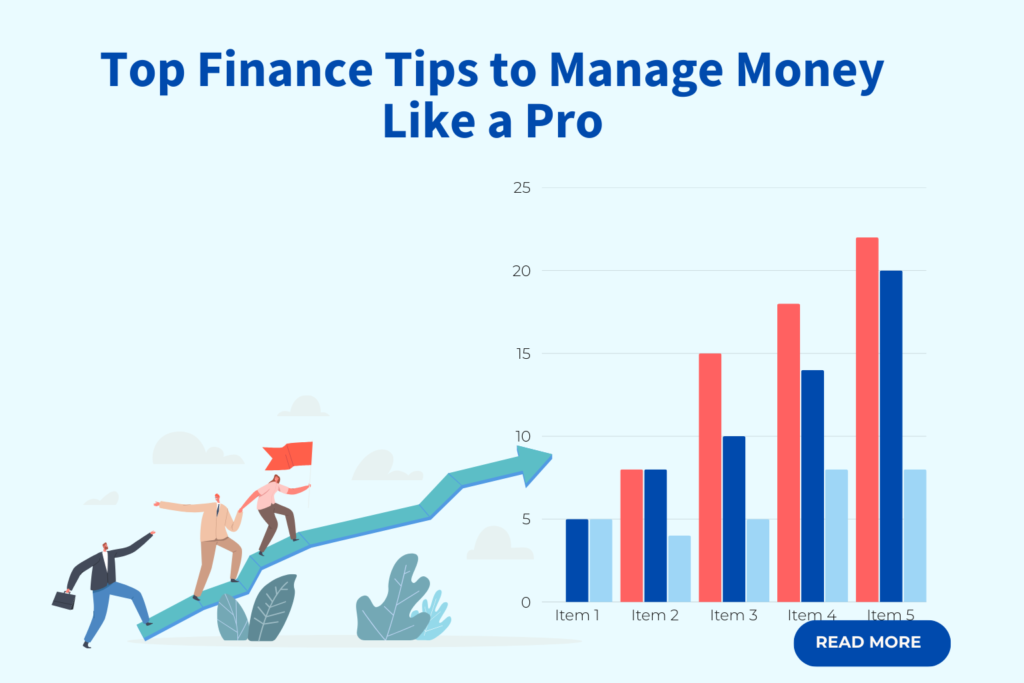Money is not all about numbers in your bank account — it’s a means that brings you freedom, stability, and peace of mind. The problem is that most people never acquire the skills of money management. So, they live paycheck to paycheck, battle debt, or feel unprepared for the future.
The good news? Anyone can get their financial life in control with the right attitude and a few down-to-earth personal finance tips. This book will provide you with fresh strategies and step-by-step guidance to manage money wiser and make smart financial decisions.
1. Think in Terms of Cash Flow, Not Just Savings

Most novices are concerned with saving a specific amount of money every month. Saving is essential, but experts maintain their cash flow — the flow of money in and out. Here is the some of the personal finance tips.
- Account for all sources of income (wages, side businesses, passive income).
- Categorize your expenses into fixed (bills, rent) and variable (dining, shopping).
- Prioritize means to boost inflow while minimizing outflow.
This change of mindset is one of the most sophisticated yet uncomplicated personal money management tips.
2. Notice Your Spending Triggers
We tend to spend emotionally rather than logically. Do you shop online when you feel stressed? Do you spend too much when friends invite you out? Identifying these triggers is crucial.
An excellent bit of personal finance advice is to:
- Wait 24 hours before purchasing non-essential products.
- Pay with cash instead of cards to get a feel for the cost.
- Steer clear of “buy now, pay later” situations.
Knowing your spending psychology matters as much as budgeting.
3. Leverage the Power of Automation
Money management can become easier than ever through technology. Automating finances means saving and investing first before spending even crosses your mind.
Examples:
- Automatically transfer 10–20% of income to savings/investment accounts.
- Make bill payments automatic to not pay extra charges.
- Utilize apps that automatically categorize expenses.
This is perhaps one of the most under-leveraged finance tips for beginners that assures discipline without any effort.
4. Develop Multiple Income Streams
Dependence on one salary is unsafe. Experts have multiple income sources to plan for their future.
Some ideas for financial tips for young people:
- Freelancing or online part-time work
- Rental income
- Investments that give dividends
- Selling digital products
Having a little side hustle is enough to stabilize your finances.
5. Master the Art of Smart Borrowing
Debt is not always the enemy. Sometimes borrowing can be strategic — for example, taking a loan for higher education or starting a business.
Here’s advice about personal finance when it comes to borrowing:
- Only borrow for appreciating assets (like education or property).
- Avoid loans for luxury items.
- Always compare interest rates before signing.
This separates smart financial planning from careless spending.
6. Protect Yourself with the Right Insurance
One trip to the hospital or accident is enough to erase years of savings. That’s why insurance is a must when it comes to personal financial planning tips.
Types to consider:
- Health insurance for medical emergencies
- Life insurance to provide for your family’s future
- Asset insurance (car, house, business)
Insurance is not a cost; it’s protection.
7. Women and Financial Independence
For females, money management is not only saving but empowerment as well. Most women rely on others to make financial decisions, but that has to change now.
Practical financial advice for women:
- Maintain separate savings accounts.
- Invest in properties in your individual name.
- Establish long-term retirement and medical funds.
These finance tips for women ensure independence throughout life.
8. Plan for Taxation Early
Most newbies neglect taxes at the eleventh hour, missing out on possible savings. Astute tax planning will help you retain more of what you have.
Some useful finance tips:
- Find out about tax-saving vehicles such as ELSS, PPF, and NPS.
- Claim tax deductions for insurance, education, or home loans.
- Utilize apps to compute tax in advance.
Effective tax planning is a type of advice on money management that is worth it annually.
9. Create a Personal Growth Fund
Not every saving has to go towards banks or investments. Set aside a special fund for personal development — courses, certifications, or skill acquisition.
Why? Because the return on investment in yourself is the highest. These are financial investment tips that enhance your earning power directly.
10. Review and Adjust Regularly
Finance isn’t “set it and forget it.” Life happens — new career, family obligations, or aspirations. Checking your plan every few months keeps you on track.
- Re-check your budget quarterly.
- Adjust investments according to market fluctuations.
- Review goals to determine whether you’re closer or require adjustments.
This ongoing refinement is one of the best professional-level finance tips for beginners.
Final Thoughts
Money isn’t about how much you make — it’s about how smart you are with what you have. From handling cash flow to creating several sources of income,personal finance saving tips to financial investment tips, every financial choice will determine your financial future.
If you’re young and just beginning, or you’re preparing for retirement, by following these top personal finance tips for beginners you will feel confident and in control.
Remember, smart financial management is not about being rich; it’s about being prepared, independent, and stress-free. Start today, apply these finance tips, and you’ll soon manage money like a true pro.
Frequently Asked Questions (FAQ)
Q1: What are the top personal finance tips for beginners to start with?
A: The best personal money management tips for newbies involve creating a budget that corresponds with your income and expenses, saving before spending, not indulging in high-interest debt, and establishing a financial cushion. These are essentials that create a solid financial base.
Q2: How can I use personal money management tips to improve my daily finances?
A: Apply personal money management advice such as monitoring all expenses for one month, distinguishing between needs and wants, imposing spending limits, and setting bills to pay automatically. Such minor alterations ease and make money management a habit.
Q3: What personal finance saving tips are most effective?
A: Good personal finance saving advice is to “pay yourself first” (save immediately when you’re paid), make automatic transfers to the savings, eliminate small frequent expenses, and save in a separate account from money used for spending so you’re less likely to dip into it.
Q4: What personal financial planning tips should beginners know?
A: The most important personal financial planning advice is to establish clearly defined financial objectives (such as buying a house or retirement), charting the amount you will require & when, selecting investing/saving instruments appropriate for your objectives, and periodically examining your plan to make changes in response to life’s changes.
Q5: Why is advice about personal finance especially important for young people?
A: Advice on finance to young individuals is important since early starts provide additional time for compound interest and savings growth. Knowledge about finance tips to young individuals (e.g. investing early on, staying away from unnecessary debt) establishes simpler, more stable financial trajectories over the long term.
Q6: Are there specific finance tips for women I should consider?
A: Yes. Financial advice for women tends to consist of having financial independence (separate bank accounts), investing in one’s own name, maintaining proper health and life insurance, planning maternity leaves, and acquiring investment knowledge. These bring confidence as well as long‐term financial security.




